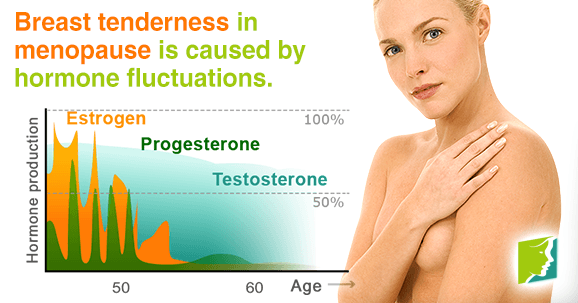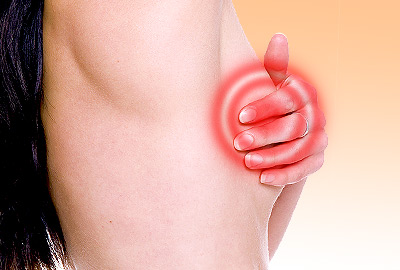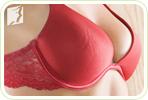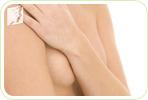The most common cause of breast tenderness during menopause is hormone fluctuations, specifically of the sex hormones estrogen, progesterone, and testosterone. These fluctuations can cause inflammation of breast tissue, resulting in tenderness. Breast tenderness characteristics include mild to moderate discomfort, sensitivity to touch, and a dull, achy pain.
Types of Breast Pain
There are two types of breast pain, cyclical and non-cyclical. Cyclical is the most common, which occurs intermittently, or in pattern form. This typically happens during premenstrual syndrome, pregnancy, and menopause, when hormones are fluctuating. Non-cyclical breast pain is constant, and typically with a clear cause (e.g., previous physical trauma). Medically, breast tenderness is called mastalgia or mammalgia. Breast tenderness varies between women, depending on genetics, lifestyle, and shifts in estrogen levels.
Treatment Options
There are a few simple treatment options for breast tenderness: lifestyle adjustments, herbal remedies, and prescription medications or surgery if pain becomes intolerable. It is important to note, if you are experiencing intense pain that persists, find any lumps, or have nipple discharge, you should contact a doctor immediately.
Lifestyle changes
A few simple lifestyle changes that can help alleviate breast tenderness are getting sufficient exercise, plenty of sleep, and trying to avoid salty foods, alcohol, and caffeine - all of which can worsen the pain. The recommended amount of exercise per day is at least 30 minutes of aerobic activity. Walking, swimming, and yoga are all good forms of low-impact exercise.
Getting plenty of sleep is important to your overall health and directly affects how you feel during the day. Lack of sleep can make you more susceptible to discomfort. Other simple tips include using an ice pack, wearing a soft, supportive bra when doing any kind of physical activity, and trying breathing exercises or meditation.
Herbal remedies
Herbal remedies are an easy and affordable option for treating breast tenderness. The two most common herbs are evening primrose oil and chasteberry. Though evening primrose oil has been used to treat a vast number of maladies, research about its effectiveness is conflicting. Chasteberry has been used for thousands of years for treating premenstrual symptoms and today is used to help alleviate menopause symptoms. Most women find it to be effective in reducing tenderness.
Medications
Prescription medications are typically not the first recommendation because they are higher risk, more expensive options. However, if you are experiencing pain that is intolerable, it may be time to contact your doctor and research some options.
Hormone replacement therapy (HRT) is a common drug therapy for menopause symptoms caused by hormone imbalance; however, there are some serious side effect that accompany it. An increased risk of breast and ovarian cancer, blood clots, and strokes are among the possible side effects of this treatment, so consult your doctor before choosing HRT. Again, it should be emphasized that it is the last recommended option, due to its high risks and costs. These should only be considered if breast pain is becoming unbearable.
Menopause symptoms can be extremely bothersome, and they affect almost all women at some point during this stage. Breast tenderness is one of the symptoms that can fortunately be easily managed by making some simple lifestyle changes, trying out a few herbal remedies, and possibly looking into prescription medications.
Click on the following link for further information on how to manage breast pain during menopause.
Sources
- Carmichael, A.R. (2008). Can Vitex Agnus Castus be Used for the Treatment of Mastalgia? What is the Current Evidence? Evidence-based Complementary and Alternative Medicine, 5(3), 247-250. doi: 10.1093/ecam/nem074
- National Institute of Aging. (2015). Hormones and Menopause. Retrieved January 26, 2016, from http://www.nia.nih.gov/health/publication/hormones-and-menopause
- Office on Women's Health. (2010). Menopause. Retrieved January 26, 2016, from http://www.womenshealth.gov/menopause/menopause-mental-health/index.html
- University of Maryland Medical Center. (2015). Evening primrose oil. Retrieved January 26, 2016, from http://umm.edu/health/medical/altmed/herb/evening-primrose-oil




